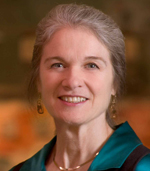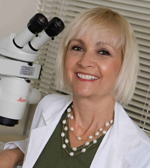February 25, 2013 - By Michelle Brandt

Marcia Stefanick
Are the brains of men and women really different? In an upcoming Stanford symposium, a group of researchers will delve into specific scientific topics regarding sex differences in the brain — starting with the question of what, if anything, makes a brain "female" versus "male."
The Basic and Translational Neuroscience Research Symposium on Sex Differences will be held March 6 at the Li Ka Shing Center for Learning and Knowledge on the campus of the Stanford University Medical Center. The event is free and open to the Stanford community, though registration is required. There is also a free pre-symposium presentation for the public at the Clark Center auditorium the evening before.
The symposium marks the official launch of the Stanford Center for Health Research on Women and Sex Differences in Medicine (to be known as the WSDM or "wisdom" center), which will encourage scientists to study sex differences in cells, tissues, animal models and human health outcomes across the life span, with an emphasis on women's health, on which research has lagged. The center also aims to understand and reduce the health disparities experienced by men, whose life spans are substantially shorter than women, in all racial/ethnic and socioeconomic groups in countries throughout the world.

Lynn Westphal
The center will unite the many Stanford faculty members conducting health research on women and sex differences in basic biology and the influence of gender on disease. Some researchers, for example, are examining a risk factor for Alzheimer's disease that may be seen in women only. Others are studying how to tailor diagnostic tests and treatments for women, as well as men, with cardiovascular disease. The center hopes to promote further research in all medical disciplines, as well as identify clinical areas (such as health issues in gay, lesbian and transgender people) that need to be recognized in order to provide health equity for everyone.
Marcia Stefanick, PhD, professor of medicine and of obstetrics and gynecology, and Lynn Westphal, MD, associate professor of obstetrics and gynecology, are co-directors of the center, which evolved from Women's Health @ Stanford, a multidisciplinary program that was started in 2001 within the Department of Obstetrics and Gynecology.
Both directors felt strongly that the center's emphasis should not be solely on women, but also on their Y-chromosomed (and gender variant) counterparts. Women have better outcomes than men in many disease categories, but worse outcomes in others. Investigating why, for example, men have more all-cause cancers and more heart disease, and die at higher rates than women in every age category until age 80 and older, could be of clinical benefit to both sexes, they say, as will learning why women suffer more from autoimmune diseases and other illnesses.
"Understanding the reasons would shed light on diseases and allow us to tailor treatments," said Westphal.
The center's preliminary kick-off event will be an evening talk on March 5 by Louann Brizendine, MD, clinical professor of psychiatry at the University of California-San Francisco, and author of The Female Brain and The Male Brain. The neuroscience research symposium will start March 6 at noon with "seXX & seXY: A Dialogue on the Female Brain and the Male Brain," between Brizendine and Daphna Joel, PhD, professor of psychological sciences and neuroscience at Tel-Aviv University, which will be followed by sessions on:
- The genetics of social behavior, with Nirao Shah, MD, PhD, associate professor of anatomy at UCSF.
- Stem cells, with Marius Wernig, MD, assistant professor of pathology.
- Brain signatures of behavioral sex differences, with Russell Fernald, PhD, professor of biology.
- Sex, brain and psychopathology, with Daphna Joel.
- Girls, boys and autism, with Joachim Hallmayer, MD, and Antonio Hardan, MD, associate professors of psychiatry and behavioral sciences.
- Sex differences in Alzheimer's disease, with Victor Henderson, MD, professor of health research and policy and of neurology and neurological sciences.
- Sex differences in obesity, with Art Arnold, PhD, distinguished professor of integrative biology and physiology at UCLA.
Public education events like these are an important component of the new center, which will sponsor two themed research symposia and a more general women's health forum each year. (Susan Love, MD, author of Susan Love's Breast Book, will be the keynote speaker for the May 15 event.) Such events are designed to interest both a lay and professional audience, and "if we manage to encourage even one faculty to do research on sex differences in his/her discipline that wouldn't otherwise have been done, we'll consider the event a success," Stefanick said.
Space is limited, and event organizers are asking that people register at http://tinyurl.com/Women-Sex-Differences-Mar-2013. For questions about the symposium, contact Sonoo Thadaney at sonoot@stanford.edu.
About Stanford Medicine
Stanford Medicine is an integrated academic health system comprising the Stanford School of Medicine and adult and pediatric health care delivery systems. Together, they harness the full potential of biomedicine through collaborative research, education and clinical care for patients. For more information, please visit med.stanford.edu.